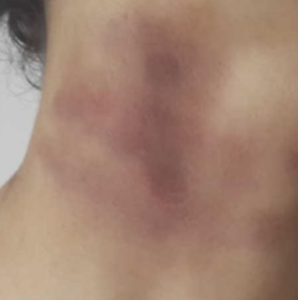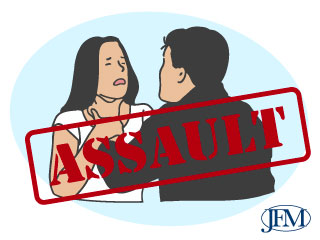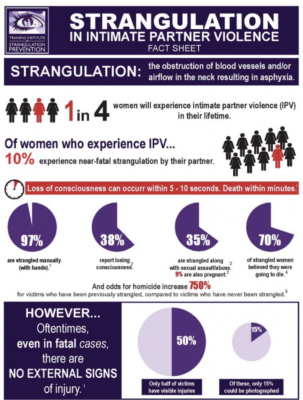Freehold NJ Criminal Attorney for Second Degree Strangulation Aggravated Assault Charge
 An act of strangulation committed against someone who falls under the protection of the New Jersey Prevention of Domestic Violence Act was made a second degree crime under a revised law put into place in July 2021. This modification represents one of the most significant charges in the aggravated assault law that our Monmouth County criminal lawyers can recall. Someone charged with aggravated assault based on choking now faces 5 to 10 years in prison in Freehold if they are convicted of this form of N.J.S.A. 2C:12-1b offense. If you were arrested for allegedly choking or strangulating your wife, husband, boyfriend, girlfriend, brother, sister or someone you were romantically involved with, you clearly need to retain the very best defense attorney that you can find. We are certainly a formidable option to help defend you when accused of this unlawful act.
An act of strangulation committed against someone who falls under the protection of the New Jersey Prevention of Domestic Violence Act was made a second degree crime under a revised law put into place in July 2021. This modification represents one of the most significant charges in the aggravated assault law that our Monmouth County criminal lawyers can recall. Someone charged with aggravated assault based on choking now faces 5 to 10 years in prison in Freehold if they are convicted of this form of N.J.S.A. 2C:12-1b offense. If you were arrested for allegedly choking or strangulating your wife, husband, boyfriend, girlfriend, brother, sister or someone you were romantically involved with, you clearly need to retain the very best defense attorney that you can find. We are certainly a formidable option to help defend you when accused of this unlawful act.
We are the Law Offices of Jonathan F. Marshall, a powerhouse criminal firm based in Monmouth County. Our credentials for defending your strangulation accusation are clearly exceptional and include:
- A team of 13 criminal attorneys, making us one of the largest of its kind in the entire state
- Over 200 years of combined experience defending aggravated assault and domestic violence charges
- A staff that includes individuals who have served as the Director of the Domestic Violence Unit, Major Crimes, Juvenile and other key positions at the Monmouth County Prosecutor’s Office
- Former prosecutors who have served in municipal courts like the one in Wall Township, Middletown, Holmdel, Howell, Aberdeen, Matawan, Hazlet, Colts Neck, Highlands, Manasquan, Brielle, and others
- Certified criminal trial attorneys
- Offices conveniently located throughout Monmouth County, including directly across the street from the county courthouse in Freehold, New Jersey
For a free initial consultation with a lawyer at the firm, call (732) 462-1197 anytime, 24/7. A member of the defense team will be more than happy to assist you with questions, options for defending an aggravated assault case, a related restraining order, and any other legal needs you may have.
How Does the Strangulation Provision of the Aggravated Assault Law Read?
The provision that targets strangulation or choking during the course of domestic violence is set forth at N.J.S.A. 2C:12-1(b)(13). An individual commits type of second degree aggravated assault if they:
(13) Knowingly or, under circumstances manifesting extreme indifference to the value of human life, recklessly obstructs the breathing or blood circulation of a person who, with respect to the actor, meets the definition of a victim of domestic violence, as defined in subsection d. of section 3 of P.L.1991, c. 261(C.2C:25-19), by applying pressure on the throat or neck or blocking the nose or mouth of such person, thereby causing or attempting to cause bodily injury.
Who Qualifies as a Victim of Domestic Violence Under N.J.S.A. 2C:12-1b(13)?
It is important to keep in mind that this form of aggravated assault only applies to individuals who constitute a domestic violence victim. To determine whether this applies to your charge, you need to refer to subsection d of N.J.S.A. 2C:25-19 since that is the statute that defines who qualifies as a “victim of domestic violence”. An individual falls under this definition if they are at least 18 years of age and are assaulted by a spouse, former spouse, present or former household member, someone they share a child in common, or someone with whom there was a dating relationship. You can only be charged and convicted for obstructing the breathing of someone in violation of N.J.S.A. 2C:12-1b(13) where the victim of the assault falls under one of these categories.
who qualifies as a “victim of domestic violence”. An individual falls under this definition if they are at least 18 years of age and are assaulted by a spouse, former spouse, present or former household member, someone they share a child in common, or someone with whom there was a dating relationship. You can only be charged and convicted for obstructing the breathing of someone in violation of N.J.S.A. 2C:12-1b(13) where the victim of the assault falls under one of these categories.
What are the Elements of Proof that must be Established By The Prosecutor To Prove You Guilty for an Aggravated Assault Based on Strangulation/Choking?
There are basically four (4) things that must be proven by the state in order for you to be convicted of second degree aggravated assault based on asphyxia of a domestic violence victim. First, the person who was purportedly assaulted must be someone who was or is your wife/husband, boyfriend/girlfriend, someone you lived with, or someone you dated. Second, you must have obstructed the breathing or blood circulation of that person. Third, the airway obstruction must have been caused by your applying pressure to his or her throat, neck, or blocking their nose or mouth. Fourth, your conduct must have been knowing (i.e. you knew you were obstructing their breathing) or you acted recklessly under circumstances manifesting extreme indifference to the value of human life.
What are the Penalties for Strangulation Aggravated Assault?
It is a second degree crime to choke someone during the course of an incident of domestic violence. What this means is that this crime is punishable by a minimum of five (5) years and up to ten (10) years in prison if the prosecutor secures a conviction for this offense. You will also have to serve at least eighty-five (85) percent of whatever term of imprisonment is imposed by the sentence before you will be eligible for parole, since the No Early Release Act (“NERA”) applies to this serious charge. A fine of up to $150,000 may also be imposed at the time of sentencing, which is a significant aspect of the punishment for this felony.
What this means is that this crime is punishable by a minimum of five (5) years and up to ten (10) years in prison if the prosecutor secures a conviction for this offense. You will also have to serve at least eighty-five (85) percent of whatever term of imprisonment is imposed by the sentence before you will be eligible for parole, since the No Early Release Act (“NERA”) applies to this serious charge. A fine of up to $150,000 may also be imposed at the time of sentencing, which is a significant aspect of the punishment for this felony.
Can I Avoid Prosecution for Strangulation or Choking Someone By Applying for Pretrial Intervention (“PTI”)?
This is a common question posed by clients charged with this offense. Unfortunately, it is extremely difficult to secure PTI in a case of this nature for a least two (2) reasons. First, a second degree crime is ineligible for diversion through PTI. Second, there is a stated policy providing that domestic violence cases are to be excluded from relief under the program. Notwithstanding these two impediments to securing Pretrial Intervention, the program can be an option where a skilled attorney can convince the prosecutor to consent to an application.
 Why Was I Served With a Restraining Order?
Why Was I Served With a Restraining Order?
The legal analysis and discussion provided by our criminal defense attorneys up until here was limited to a criminal charge stemming from domestic strangulation. However, an individual is commonly also subject restraining order when this type of incident occurs. In other words, you may be required to defend a criminal charge at the Monmouth County Superior Court, Criminal Division, and also a restraining order action in the Family Division. Please note that a temporary restraining order and the resulting Family Court proceeding we are referring to is something entirely different from a no contact order signed when a criminal complaint is issued. The no contact order is extinguished at the conclusion of the criminal case, whereas a final restraining order is permanent and exposes a defendant to a separate criminal charge for violation of a restraining order anytime he/she has contact with the victim in the future.
Does Holding Someone Back Constitute a Choke Under This Law?
No, you aren’t supposed to be arrested for choking a person where you were just holding another person back by their shoulders or even the neck. Remember, there must be knowledge or evidence that you are strangling the person or, minimally, conduct that disregards an extremely high probability that their breathing is being obstructed (i.e. reckless disregard). Unfortunately, we find way too many choking charges brought under 2C:12-1b(13) where a client attempted to defend against an aggressor, and did not make an intentional move to cut off someone’s breathing, only to be charged with this offense after law enforcement arrives at the scene. If you find yourself in this situation, or even if you actually had a lapse in judgment and strangled someone, our Monmouth County domestic violence attorneys can help you.
How Do I Secure Bail or Pretrial Release In a Domestic Violence Aggravated Assault Strangulation Case?
Pretrial release conditioned on posting cash bail, a bail bond, or another monetary pledge was largely eliminated in New Jersey several years ago. So it’s not simply a matter of the police calling a judge to set bail once someone is arrested for aggravated assault or another domestic violence criminal charge. Instead, the accused must be taken to the Monmouth County Jail to await an initial appearance at the Superior Court in Freehold. The related hearing occurs within twenty-four (24) hours and is needed in order for a judge to set the condition(s) of pretrial release. However, if the prosecutor files a motion to detain, the hearing cannot proceed, nor can the accused secure immediate release. The proceedings are rescheduled, typically three (3) days later, where a criminal judge must decide whether the defendant should be released prior to his/her trial or should remain in custody because of the risk that he/she will commit another offense, fail to appear in the case, or obstruct prosecution.
Contact The Highly Skilled Aggravated Assault Defense Lawyers at our Freehold Office
Unfortunately, it is commonplace on the internet for individuals to portray themselves as gifted trial attorneys when the truth is that they have actually conducted very few or even zero jury trials for severe, violent, felony cases. This is extremely problematic because a jury trial is actually the setting where your case will have to be resolved if you are unwilling to agree with whatever extreme penalties the prosecutor may want to impose under a plea. Don’t make the potentially devastating mistake of selecting a lawyer with limited or no jury trial experience when you have the opportunity to consult our firm and our legal team that has conducted hundreds. Call our Freehold Office at (732) 462-1197 to speak to an accomplished defense attorney immediately.









